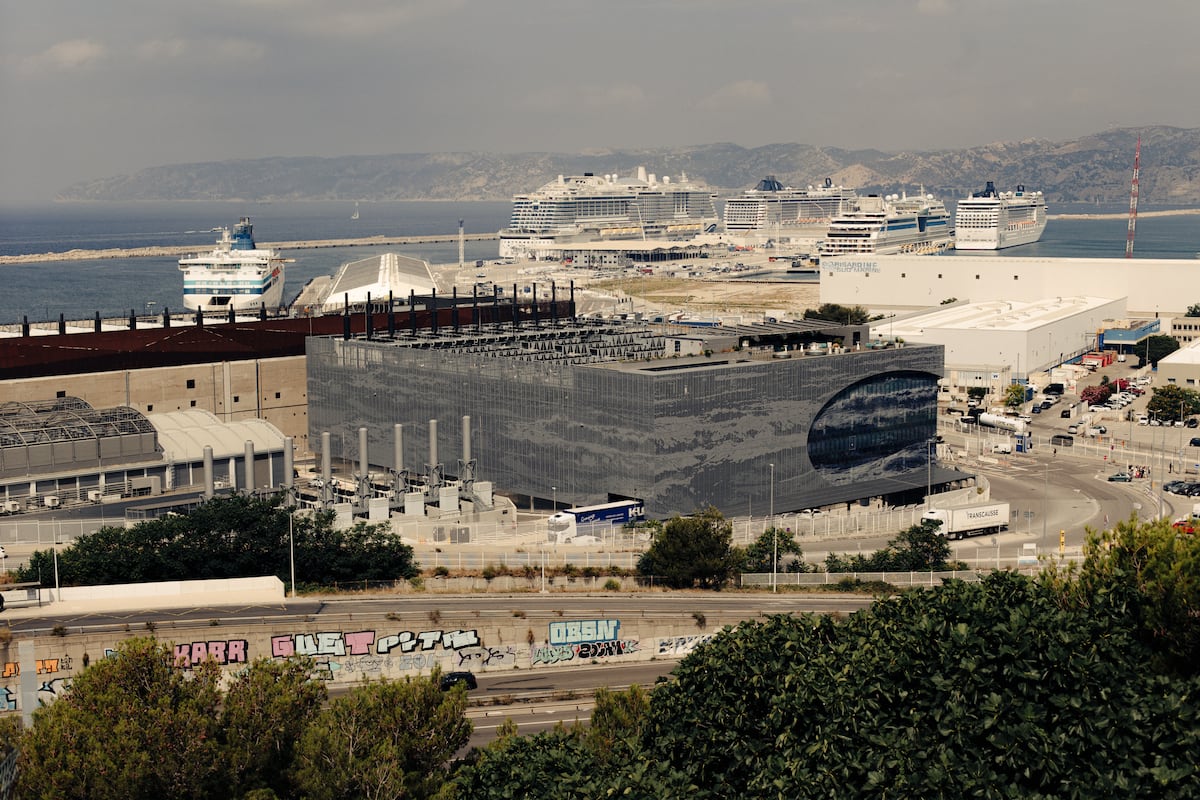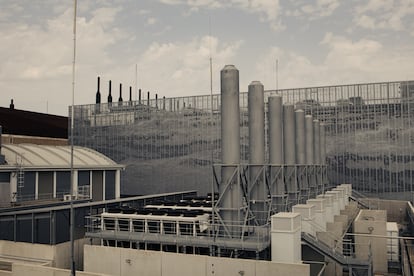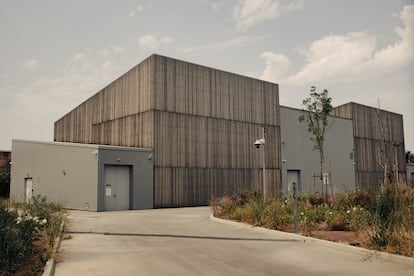
Data centers are drying up the Port of Marseille: ‘They consume enormous amounts of electricity’
作者:Manuel G. Pascual
At the Marseille Provence Cruise Terminal, almost five miles from the charming Old Port that marks the center of the city, four enormous ships are docked. Behind them, following the coast to the north, another can be seen in the shipyards.
The silhouettes of these floating hotels are familiar sights from some of the homes in the humble Saint-André neighborhood. Located in the northwest of the city, it’s the closest to the port area. Residents have to live with the constant roar of the engines of these steel hulks, which must remain running to provide onboard services. The sea breeze makes the smoke spewing from their chimneys barely perceptible today… but locals tell EL PAÍS that, on some days, the air is very cloudy.
City Hall has a plan to make the presence of cruise ships more bearable: electrify them and connect them to the grid, so they can shut down their engines and still continue operating. The idea is that shipyard repairs — as well as loading and unloading operations at the dock — will also use this energy. But it’s unclear whether there will be enough electricity to make this feasible. This is because data centers in the port area, active since 2021, have priority when it comes to the energy that’s available.
“They consume enormous amounts of electricity and reserve electrical power in a speculative and monopolistic manner. This raises the prospect of future usage conflicts regarding the electricity supply,” Sébastien Barles, the city’s deputy mayor, tells EL PAÍS.
In the last meeting between port authorities, regional authorities and residents, it was reported that the ship electrification project was being postponed until 2029. “Currently, the data centers only have negative effects on the residents of Marseille,” the politician emphasizes.
The opinion expressed by Barles, a member of the Greens, contrasts with that of Mayor Benoît Payan. A member of the Socialist Party, Payan has led the coalition that has governed the City Council since 2020. He views the digital wave as an opportunity for Marseille’s economic growth.
Barles’ perspective also clashes with the vision of President Emmanuel Macron, who in February announced foreign investments of more than €100 billion ($116 billion) in artificial intelligence (AI). Much of this money will be dedicated to building data centers… the key infrastructure for the operation and development of this technology.
In the last decade, Marseille has gone from irrelevance to becoming the seventh-largest city in the world in terms of data traffic. The American company Digital Realty has four data centers operating in the city. Three of them are in the port, literally next to the cruise terminal. Particularly striking is the one that occupies a former submarine base resembling a giant bunker, built by the Germans during World War II.

The facilities have a futuristic appearance and heavy security measures. To enter the power transformer substation built to support these data centers — a modern and seemingly deserted building on the side of the road, with no signage — you have to scan your fingerprints, under the watchful eye of several video cameras.
This high-level technology contrasts with the rather chaotic atmosphere of the place. A few clueless tourists passing by these cold buildings in search of their cruise ship mingle with port workers, who wear hard hats and yellow vests. While wandering around, you can spot a line of cars, their roofs overflowing with luggage, waiting to board ferries to Algeria or Morocco. These boat rides can be accessed just a few feet from Digital Realty’s servers.
Not even half-a-mile away, the company is building a fifth complex where a sugar factory once stood, its large silos reflecting the city’s colonial history. “It will go from storing food to storing data,” Anti, a 30-year-old Marseille native, mutters sarcastically. “The work is progressing quickly,” he sighs, pointing at the structures. The data center is clearly visible from the hill that Anti climbs. He shows EL PAÍS how these industrial warehouses, packed with sophisticated processors, are replacing metalworking and canning factories.
Anti is part of a collective. Named Le nuage était sous nos pieds (translated as “the cloud was under our feet”), it seeks to raise awareness about “technology’s socio-environmental destruction.” He and his colleagues are concerned about how data centers are changing the city. They’ve reported continued leaks of fluorinated gases, which are used in computer cooling in the port’s data centers. And they’re concerned that these facilities are hogging energy in a city that produces only 16% of its own energy needs.

The location of data centers in the port is no coincidence: 17 submarine cables currently extend to the facility, with four more planned. “The seabed near Marseille has been well-known since the 19th century, when the first cables were laid to connect African colonies by telegraph,” Max explains. She’s Anti’s fellow activist, who, like him, prefers not to give her full name.
Today, fiber optic cables are reaching the city, which has a strategic advantage over other major ports, such as Barcelona or Genoa: it has no large mountains separating it from the heart of Europe. Cables can reach Paris, Frankfurt, Amsterdam, or London, without having to cross the Pyrenees or the Alps.
A question of energy
In some places, the main criticism that residents have about data centers has to do with the amount of water they consume to cool servers. This isn’t the case in Marseille, however, which is well-supplied with this resource. The authorities have even given Digital Realty access to water from the former underground drainage channels of the Gardanne coal mines, located north of Marseille. The water flows into the port, so the firm can use it to cool its systems. This means that only 10% of the energy consumed by this infrastructure is dedicated to cooling processors, while between 80% and 85% is used to power servers, according to data from a public consultation conducted by Le nuage était sous nos pieds. EL PAÍS hasn’t been able to verify this information with Digital Realty.
In Marseille, the main concern of those protesting against the proliferation of data centers is about energy, as illustrated by the case of the failed electrification of cruise ships. “The deputy director general of the Grand Port Maritime de Marseille estimates the electrical power required for dock electrification activities [to be] at 100 to 120 MW. The total power of the five data centers already operating in Marseille is 77 MW!” Patrick Robert exclaims. He’s president of the federation of neighborhood interest committees for Marseille’s 16th arrondissement.

When the complex being built next to the port becomes operational next year, Digital Realty’s facilities will have an installed capacity of 98 MW. And, in 2028, the company plans to open a much larger sixth center with a capacity of 50 MW in Bouc Bel Air, on the outskirts of the city.
Digital Realty, which declined to respond to this newspaper’s questions, is one of the largest operators of colocation data centers, which lease out server space or computing capacity to third parties. Its Marseille facilities serve Alphabet, Google’s parent company, as well as a French sovereign data project involving Google, Thales, Orange and Microsoft, among other firms. Disney+ was launched in France from these facilities.
Barles — the city’s deputy mayor for environmental affairs — recites the figures without hiding his concern. “Current data centers represent the equivalent of the electricity consumption of 200,000 inhabitants. But if we add the projects underway, we’re talking about the equivalent of the consumption of the entire population of Marseille: 850,000 inhabitants.” The environmentalist politician explains that this is stretching infrastructure to its limits, while requiring public investment to supply a private business. He also stresses that this compromises the city’s ability to develop “activities that generate more employment” in the future.
The specter of shortages has loomed since the 2022 energy crisis, when Russia cut off gas supplies to Europe. “To get through that winter, the authorities established a plan for local power outages in case of supply problems. Neighborhood outages were planned… but cutting off power to the data centers was never considered,” Barles notes. At the time, he was already a member of the City Council. “This raises questions about the priorities of our society,” he warns.
Translated by Avik Jain Chatlani.
Sign up for our weekly newsletter to get more English-language news coverage from EL PAÍS USA Edition
